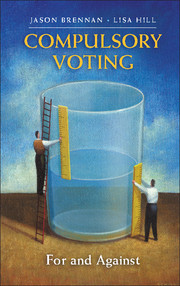4 - Should We Force the Drunk to Drive?
Published online by Cambridge University Press: 05 June 2014
Summary
The State of the Debate
The main argument against compulsory voting is the sheer weakness of the arguments for it. Over the past three chapters, we examined many attempts to justify compulsory voting. Some of these arguments were incoherent or self-contradictory. Others relied on questionable or discredited empirical speculations. Others relied on false or implausible normative premises. Even if we ignored these serious flaws, none of these arguments could then explain why a voting lottery would not be superior to compulsory voting. All the arguments were defective. The best of the arguments gave us little reason to support compulsory voting. Most of the arguments gave us no reason to support it at all.
At this point, we must conclude compulsory voting is unjust. Governments may not impose compulsory voting on their citizens, even if the overwhelming majority of citizens enthusiastically support compulsory voting. Australia, Belgium, and other countries must repeal their compulsory-voting laws immediately.
In this chapter, I stop refuting arguments for compulsory voting and instead produce an independent argument against it. In a sense, previous chapters argued that compulsory voting is bad because it is not good. This chapter argues compulsory voting is bad because it is bad. Remember, however, that the other side bears the burden of proof. Strictly speaking, to undermine compulsory voting, I do not need my argument in this chapter to succeed. The arguments of the other three chapters suffice.
- Type
- Chapter
- Information
- Compulsory VotingFor and Against, pp. 83 - 108Publisher: Cambridge University PressPrint publication year: 2014
References
- 2
- Cited by



